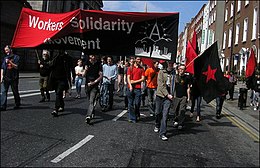
| Part of a series on |
| Anarchism |
|---|
 |
Anarchism in Ireland has its roots in the stateless organisation of the tuatha in Gaelic Ireland. It first began to emerge from the libertarian socialist tendencies within the Irish republican movement, with anarchist individuals and organisations sprouting out of the resurgent socialist movement during the 1880s, particularly gaining prominence during the time of the Dublin Socialist League.
One of the prominent figures in the Irish socialist republican movement was the syndicalist James Connolly, who led the formation of the Irish Transport and General Workers' Union along the lines of industrial unionism and fought in the Easter Rising as part of the Irish Citizens Army. Following the independence of Ireland and the rise of communist tendencies in the country, some left-wing republicans began to gravitate towards anarchism, including Jack White, who himself became an anarchist while fighting on the side of the Republicans in the Spanish Civil War.
It was only in the late 1960s that a specifically anarchist movement began to emerge, in the context of the civil rights movement in Northern Ireland and the outbreak of the Troubles. A number of small local groups formed and dissolved throughout the 1970s before the establishment of the Workers Solidarity Movement (WSM) in 1984, which continued to exist as a national platformist federation up until its disbandment on 8 December 2021.[1]
- ^ "WSM has come to an end - we look forward to new anarchist beginnings". Workers Solidarity Movement. 8 December 2021.
